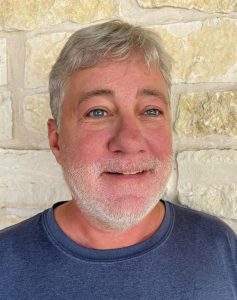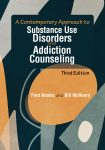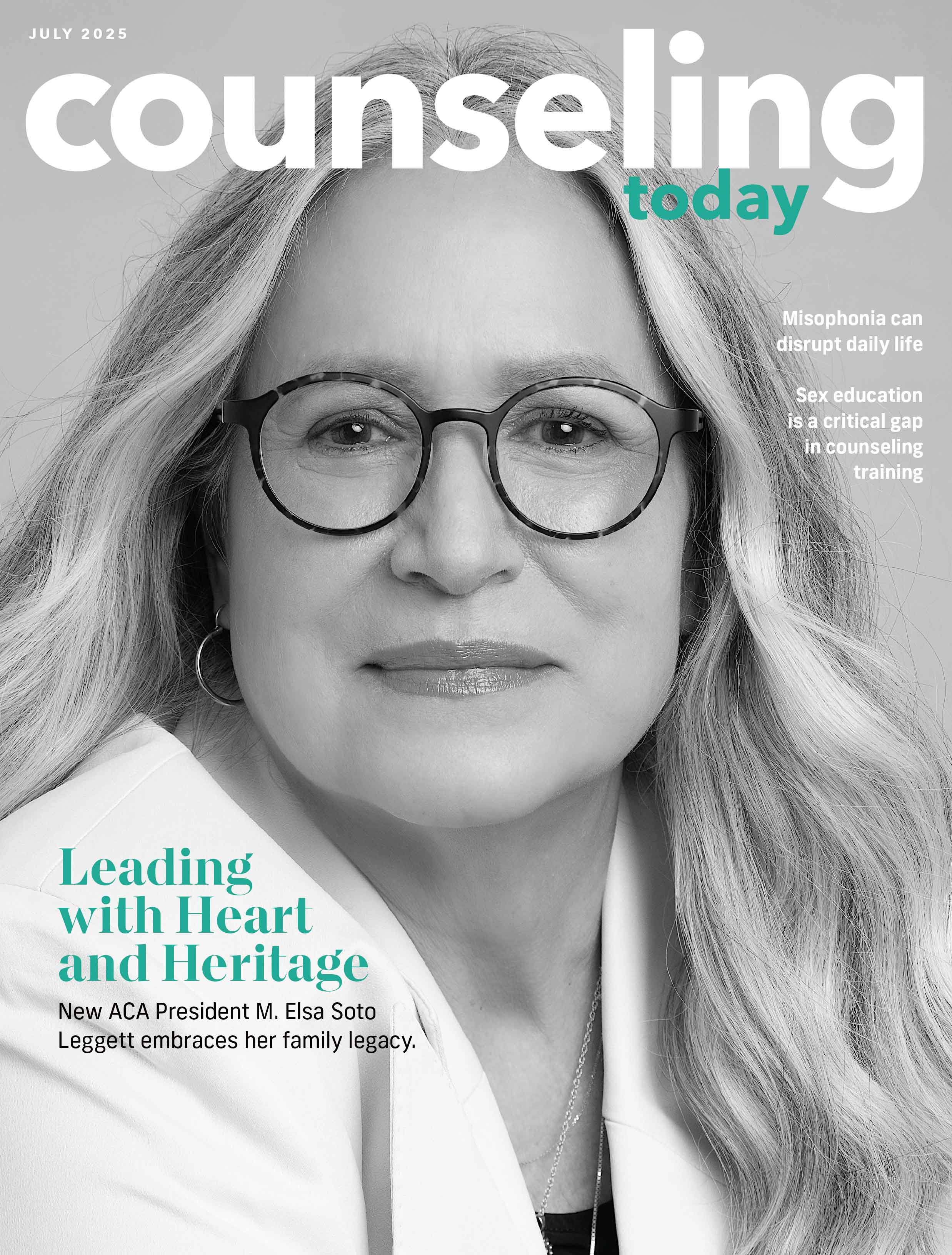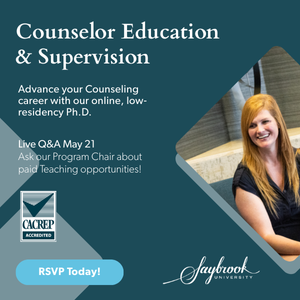Explore Counseling Today Articles
Behind the Book: Q&A with Ford Brooks and Bill McHenry on substance use and addiction
Substance use and drug overdoses have significantly increased since the start of the COVID-19 pandemic. The rising need for mental health and addiction services led co-authors Ford Brooks and Bill McHenry to publish a third edition of A Contemporary Approach to Substance Use Disorders and Addiction Counseling. The revised edition stresses the need for counselors to unlearn their biases regarding substance use and the importance of working from a multicultural framework. It also includes new sections on harm reduction strategies, medication-assisted therapy and the use of telebehavioral health therapy in treatment.
“One of the main reasons we wrote this text is to encourage readers to more fully engage in the helping process with clients with an SUD [substance use disorder],” say Brooks and McHenry in the first chapter of the book. “We hope to help you avoid our mistakes and to provide you with informative and creative approaches to working with this unique population of clients.”
Counseling Today spoke to Brooks, a professor of counselor education and director of the Growing Edges Community Clinic at Shippensburg University of Pennsylvania, and McHenry, an associate professor of counseling at St. Edward’s University, to learn more about this revised edition.
How did the COVID-19 pandemic affect substance use and mental health treatment in the United States?
 Bill McHenry:
The pandemic brought on challenging issues related to this field,
including online support, ways of coping with boredom (a huge risk
factor) and the increase of use by individuals who did not previously
meet the criteria of substance use disorder.
Bill McHenry:
The pandemic brought on challenging issues related to this field,
including online support, ways of coping with boredom (a huge risk
factor) and the increase of use by individuals who did not previously
meet the criteria of substance use disorder.
We have also seen an increase in the use of online counseling, support groups and contact with individuals (e.g., sponsors) in this population. These are most likely positive and useful new additions to existing treatment modalities. For example, the increased use of technology allows clients to attend online support groups that may be too far away to travel to in person.
How can counselors uncover and address their own biases regarding substance use disorders?
 Ford Brooks:
First, counselors need to explore where these biases may stem from.
Over the years, many of my students have been impacted personally by
addiction — through their own or their family members’ substance use —
and subsequently they have emotional pain that influences how they work
with clients withsubstance use disorders.
Ford Brooks:
First, counselors need to explore where these biases may stem from.
Over the years, many of my students have been impacted personally by
addiction — through their own or their family members’ substance use —
and subsequently they have emotional pain that influences how they work
with clients withsubstance use disorders.
I ask counseling students enrolled in my class to attend support groups for people and families dealing with substance use, such as Alcoholics Anonymous, Narcotics Anonymous and Al-Anon. Doing this helps them see how individuals who struggle with substance use and addiction are living honest, productive and sober/clean lives. It can also help students better understand people who have suffered with and from addiction.
BM: One of the best ways to challenge one’s biases and prejudices is to immerse oneself into the culture. I suggest students and practitioners attend open meetings and listen closely to the stories of individuals and their family members dealing with these challenges. Furthermore, reading literature that describes and articulates the fact that these clients are human beings first and people who happen to have a substance use disorder or addiction second can help arrest the beliefs inherent in biases against these populations. Finally, some counselors are biased due to personal experiences. I suggest they work on their family/friend history that may be hampering the ability to empathize and understand the challenges of this population.
What makes your book different from most textbooks on substance use and addiction?
FB: As with previous editions, this revised version contains real case examples to help readers better understand and apply what we are discussing. I’ve been practicing as a counselor since 1985 and have continued to see clients even after becoming a counselor educator, and the information and experiences in the book are based on my experience as clinician. I have also used the information presented in this book in my own clinical practice.
Graduate students can use our book in their work for practicum and field internships and beyond. What makes our book different is that I understand what it’s like as a counselor to sit with a person at the absolute lowest point in life and how compassion, presence, support and resources can make such a difference in the healing process.
What should counselors be aware of when working with people with disabilities with respect to substance misuse?
BM: People with disabilities can often be an overlooked population by family, friends and/or professionals in terms of both mental health issues and substance use disorders/addictions. I suggest counselors attend to the whole person rather than the disability. Simple awareness of the fact that members of this population can be overlooked in this regard can go a long way in effective assessment and treatment.
Why is self-care so vital for counselors working with this population?
FM: Working in the substance use and addiction field is challenging and demanding work, no doubt about it. It takes commitment and creativity, and it stretches our compassion and understanding and often requires us to go to places within ourselves that may be challenging.
I’d be lying if I said this work doesn’t take a toll on the counselor’s soul, but there is also some good news: This is also rewarding work. Clients get well and make changes, and being present when a client surrenders to the process of recoveryor “gets it” and is willing to make changes and take steps to live a different life, one day at a time, makes it all worth it.
Doing this type of deep work requires counselors to get their own support, including regular clinical supervision as well as their own therapy if needed. I have developed my own self-care practices that help ground me and prevent me from experiencing burnout. I run, do martial arts and go hiking or biking. I’m also an avid guitar player and magician. The support of my family and friends, my own therapy and clinical supervision have all been important in staying in the field and now as a counselor educator. All of these life-giving activities provide me with the needed separation from my work and help to bring joy and pleasure in the face of daily student and clinical challenges.
What changes do you see happening in substance use and addiction counseling in the next few years?
BM: The infusion of technology into the assessment and treatment process will continue to grow. Examples here include formal assessments provided online, and telehealth used to conduct initial screenings for client needs. There is also continued emerging discussion and use of harm reduction methods that can work for some individuals in treatment. Whether it’s the reduction of use of a substance (e.g., cutting the amount used daily in half) or needle exchange programs, I think we will see a focus on helping clients engage in changes that ultimately reduce the physical, mental and cognitive impacts of addiction.
Furthermore, with recent legislation such as overturning the Professional and Amateur Sports Protection Act, which banned sports betting in most states, I fully expect to see process addictions that include gambling addiction and technology addiction continue to increase in the future. Thus, counselors should continue to develop skills in working with process-related addictions as well as stay informed regarding new types of addiction in the coming years.
 Order Contemporary Approach to Substance Use Disorders and Addiction Counseling (third edition) from the ACA Store.
Order Contemporary Approach to Substance Use Disorders and Addiction Counseling (third edition) from the ACA Store.
The views expressed in Counseling Today are those of the authors and contributors and may not reflect the official policies or positions of the editors or the American Counseling Association.
- Assessment, Diagnosis & Treatment
- Substance-Related & Addictive Disorders
Search CT Articles
Filter CT Articles
Current Issue
Sign Up for Updates
Keep up to date on the latest in counseling practice. Sign up to receive email updates from Counseling Today.



